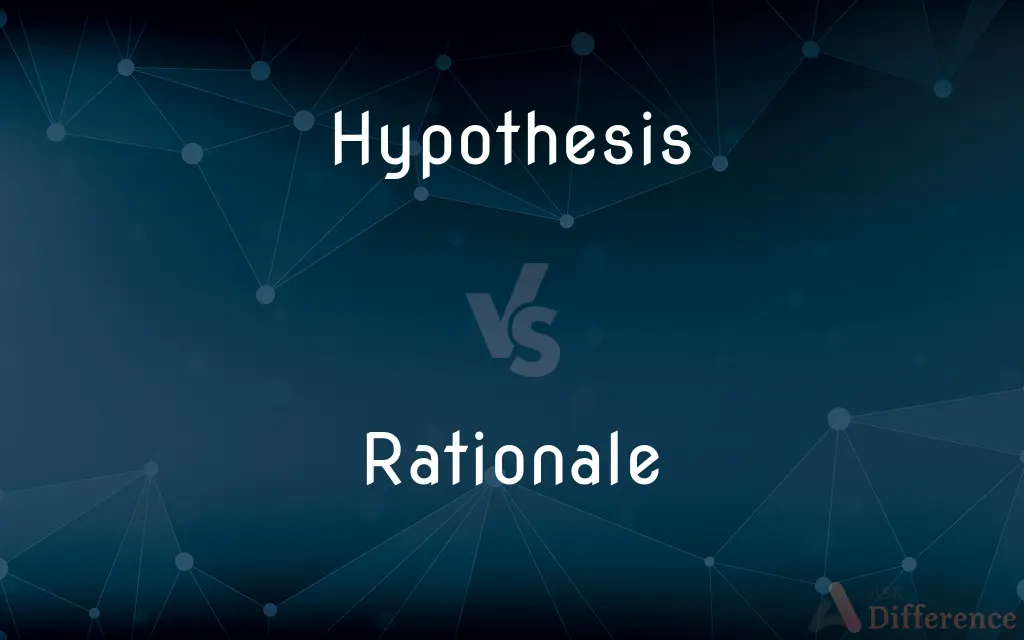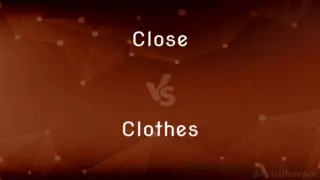Hypothesis vs. Rationale — What's the Difference?
Edited by Tayyaba Rehman — By Maham Liaqat — Updated on April 26, 2024
Hypothesis involves a testable prediction in scientific contexts, whereas rationale explains the reasoning behind decisions or actions.

Difference Between Hypothesis and Rationale
Table of Contents
ADVERTISEMENT
Key Differences
A hypothesis is a foundational element in scientific research, proposing a tentative explanation or prediction that can be tested through experimentation. In contrast, a rationale provides the underlying reasons for a particular decision or approach, often detailed in academic and strategic contexts.
In constructing a hypothesis, researchers make an educated guess based on preliminary data or observations, aiming to validate or invalidate it through empirical means. Meanwhile, rationale is drawn from existing knowledge or strategic goals, guiding the direction of actions or studies without requiring experimental validation.
Hypotheses are often used in quantitative research to establish relationships between variables that are then statistically analyzed. Rationale, on the other hand, supports qualitative approaches where the focus is on understanding the broader context and motivations behind phenomena.
The formulation of a hypothesis often precedes the experimental phase in the scientific method, serving as a basis for designing research studies. Whereas, a rationale is typically articulated to justify the methodology, choice of research, or strategic decisions, ensuring alignment with overarching objectives.
Hypotheses must be specific, measurable, and refutable to serve their purpose in the scientific inquiry process. Conversely, a rationale might not adhere to such stringent criteria but must clearly communicate the logic and intentions behind chosen actions or hypotheses.
ADVERTISEMENT
Comparison Chart
Definition
A proposed explanation for a phenomenon, formulated as a testable prediction.
The reasoning behind a decision or strategy.
Usage in Research
Central in experimental design to test relationships between variables.
Used to justify choices and guide decisions in both experimental and theoretical research.
Requirements
Must be specific, testable, and falsifiable.
Should be logical, clear, and coherent.
Outcome
Confirmed or refuted through testing and analysis.
Provides understanding and context, not tested directly.
Examples
Common in scientific studies, such as in hypotheses about behavioral effects.
Found in project proposals and strategy documents to explain choices.
Compare with Definitions
Hypothesis
Often a part of formal experiments.
They developed a hypothesis about water contamination effects.
Rationale
Supports theoretical frameworks.
The rationale integrates multiple theories of development.
Hypothesis
A speculative statement needing empirical evidence.
The hypothesis proposes that stress reduces immune function.
Rationale
.
Hypothesis
A testable prediction about the relationship between variables.
A hypothesis might state that increased sunlight increases plant growth.
Rationale
Often detailed in project proposals.
The project's rationale included enhancing user experience.
Hypothesis
A tentative explanation awaiting testing.
Her hypothesis is that sleep quality impacts memory retention.
Rationale
Guides research and strategy.
The research rationale was to identify economic factors influencing policies.
Hypothesis
Can be disproved through research.
His hypothesis that temperature affects enzyme activity was tested in the lab
Rationale
A justification for a specific decision or approach.
The rationale for the study was to explore new treatments.
Hypothesis
A hypothesis (plural hypotheses) is a proposed explanation for a phenomenon. For a hypothesis to be a scientific hypothesis, the scientific method requires that one can test it.
Rationale
Explains the reasoning behind choices.
Their rationale was that earlier intervention leads to better outcomes.
Hypothesis
A tentative explanation for an observation, phenomenon, or scientific problem that can be tested by further investigation.
Rationale
The fundamental reasons for something; the basis
The rationale for dropping the atomic bomb.
Hypothesis
Something taken to be true for the purpose of argument or investigation; an assumption.
Rationale
An explanation of the basis or fundamental reasons for something.en
Hypothesis
The antecedent of a conditional statement.
Rationale
A justification or rationalization for something.
Hypothesis
(sciences) Used loosely, a tentative conjecture explaining an observation, phenomenon or scientific problem that can be tested by further observation, investigation and/or experimentation. As a scientific term of art, see the attached quotation. Compare to theory, and quotation given there.
Rationale
A liturgical vestment worn by some Christian bishops of various denominations.
Hypothesis
(general) An assumption taken to be true for the purpose of argument or investigation.
Rationale
An explanation or exposition of the principles of some opinion, action, hypothesis, phenomenon, or the like; also, the principles themselves.
Hypothesis
(grammar) The antecedent of a conditional statement.
Rationale
(law) an explanation of the fundamental reasons (especially an explanation of the working of some device in terms of laws of nature);
The rationale for capital punishment
The principles of internal-combustion engines
Hypothesis
A supposition; a proposition or principle which is supposed or taken for granted, in order to draw a conclusion or inference for proof of the point in question; something not proved, but assumed for the purpose of argument, or to account for a fact or an occurrence; as, the hypothesis that head winds detain an overdue steamer.
An hypothesis being a mere supposition, there are no other limits to hypotheses than those of the human imagination.
Hypothesis
A tentative theory or supposition provisionally adopted to explain certain facts, and to guide in the investigation of others; hence, frequently called a working hypothesis.
Hypothesis
A proposal intended to explain certain facts or observations
Hypothesis
A tentative theory about the natural world; a concept that is not yet verified but that if true would explain certain facts or phenomena;
A scientific hypothesis that survives experimental testing becomes a scientific theory
He proposed a fresh theory of alkalis that later was accepted in chemical practices
Hypothesis
A message expressing an opinion based on incomplete evidence
Common Curiosities
What is a hypothesis?
A hypothesis is a testable prediction made to establish a cause-effect relationship between variables.
Can a rationale be part of a hypothesis?
Yes, a rationale can support the logic behind formulating a hypothesis, explaining why it was chosen.
How are hypotheses tested?
Hypotheses are tested through methods that allow for empirical assessment, such as experiments or observations.
Does every research need a hypothesis?
Not all research requires a hypothesis; some descriptive or exploratory studies might instead focus on gathering insights without a predictive element.
How detailed should a rationale be?
A rationale should be detailed enough to clearly explain the decisions and assumptions underlying a project or study.
How does a hypothesis differ from a theory?
A hypothesis is a specific, testable proposition, whereas a theory is a broader, well-established explanation of phenomena.
What types of research benefit most from a clear rationale?
All types of research benefit from a clear rationale, especially those involving complex decisions or innovative approaches.
What happens if a hypothesis is refuted?
A refuted hypothesis can lead to revisions of the initial assumptions or theories and stimulate further research.
What is the purpose of a rationale?
The rationale explains the reasoning behind decisions, methods, or approaches in research and strategic planning.
Is a rationale subject to testing?
A rationale itself is not tested; however, the decisions derived from a rationale can influence outcomes in testable ways.
Can a hypothesis lead to the development of a theory?
Yes, multiple hypotheses confirmed through research can contribute to the development of a theory.
How should a hypothesis be formulated?
A hypothesis should be clear, specific, and formulated in a way that it can be empirically tested.
Why is a rationale important in research?
It provides the context and justification for the research, guiding decisions and interpretations.
Can both a hypothesis and a rationale be included in a single study?
Yes, many studies include both to outline predictions and explain the reasons behind the chosen methods and approaches.
How can a rationale affect the outcome of research?
A well-constructed rationale can guide the research effectively, impacting its direction, design, and interpretation of results.
Share Your Discovery

Previous Comparison
Close vs. Clothes
Next Comparison
Galaxy vs. TrichiliocosmAuthor Spotlight
Written by
Maham LiaqatEdited by
Tayyaba RehmanTayyaba Rehman is a distinguished writer, currently serving as a primary contributor to askdifference.com. As a researcher in semantics and etymology, Tayyaba's passion for the complexity of languages and their distinctions has found a perfect home on the platform. Tayyaba delves into the intricacies of language, distinguishing between commonly confused words and phrases, thereby providing clarity for readers worldwide.














































